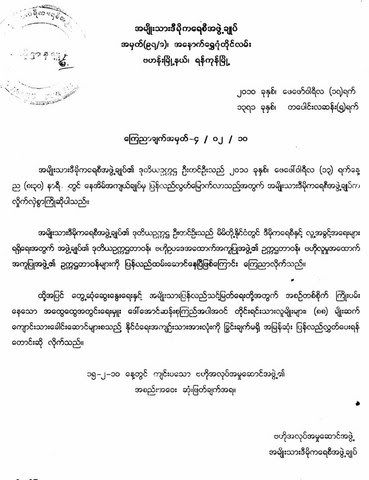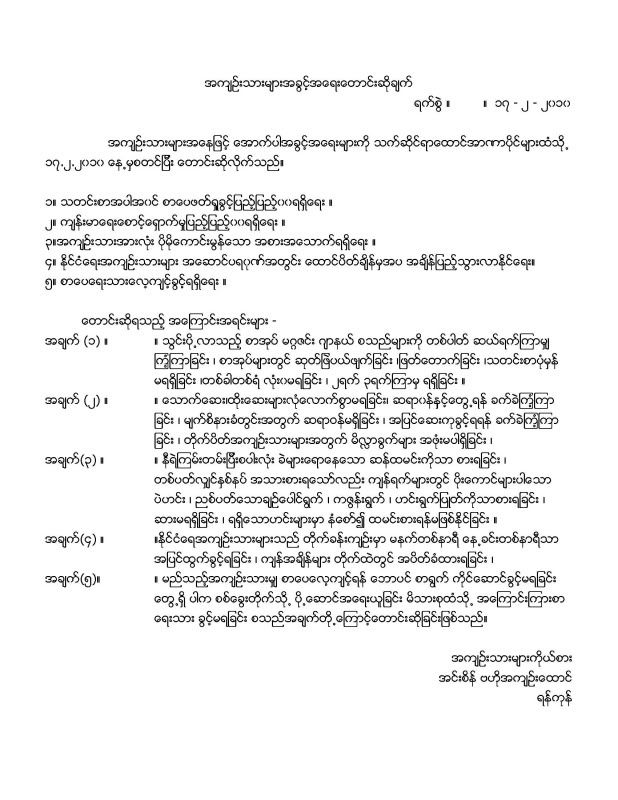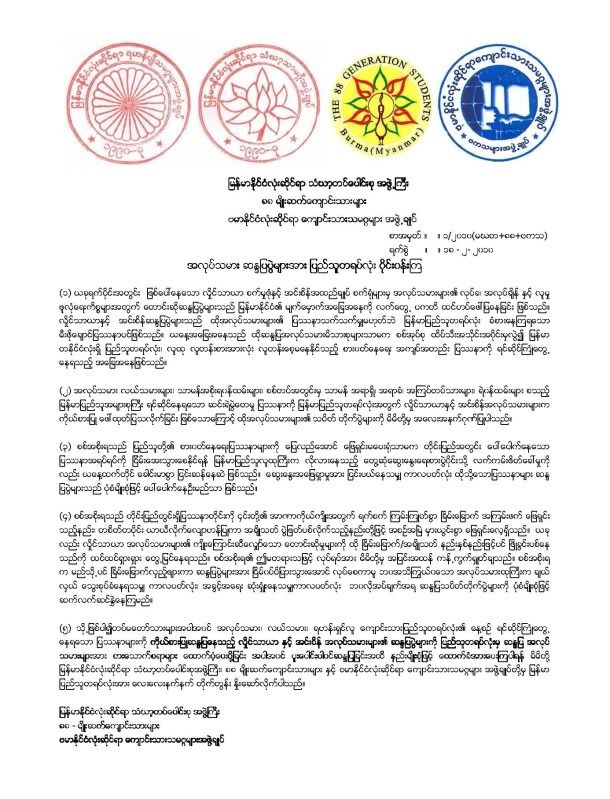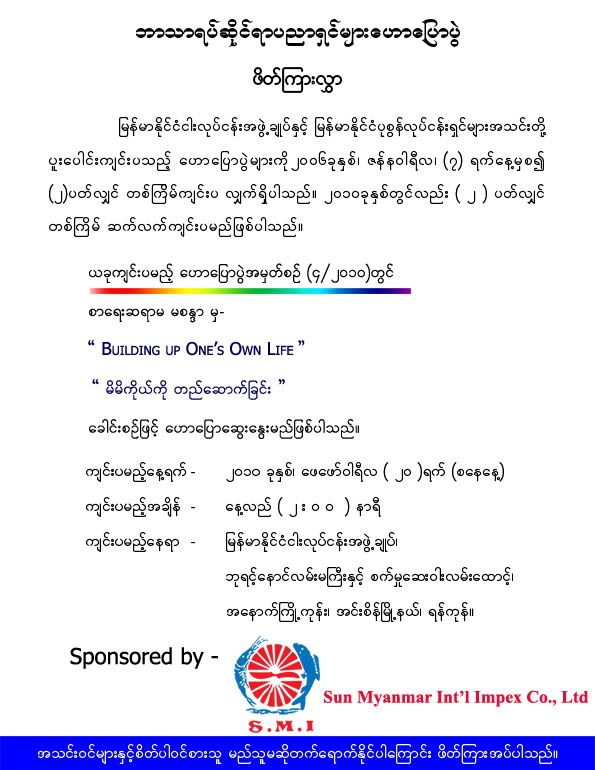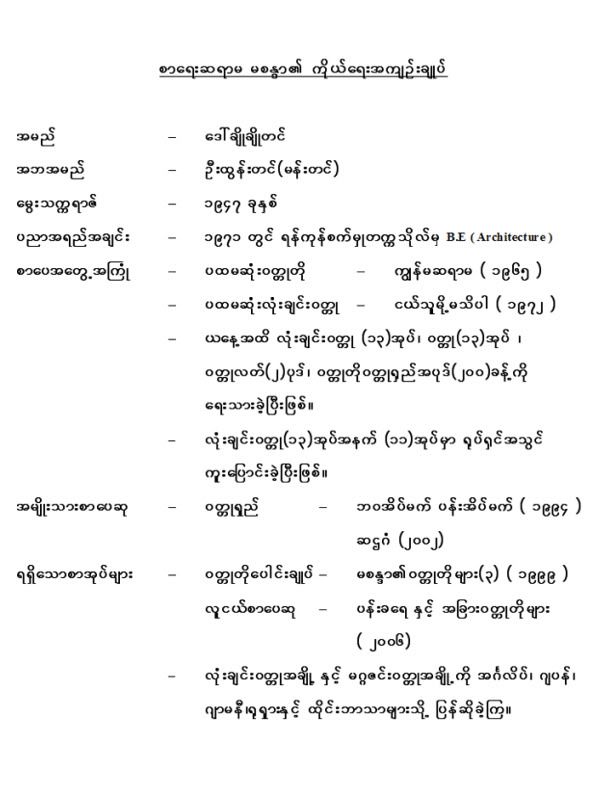
Photo: AFP
Exiled Tibetan leader Dalai Lama prays in Hsiaolin, in Kaohsiung county, southern Taiwan (2009 File)
Dalai Lama, US President to Meet at White House Thursday
Meeting has drawn angry comments from China, which says it 'firmly opposes' the visit by the exiled spiritual leader
Full story »More Top News
- Afghanistan Wants Custody of Captured Taliban Leader
- Gunfire Erupts Near President's Residence in Niger
- Britain, Ireland Summon Israeli Envoys Over Fake Passports Used in Hamas Killing
- Blast Kills 25 in NW Pakistan
- In Eastern India, Maoist Rebels Kill Ten Villagers
- 'Merchant of Death' Faces New Extradition Hearing in Thailand
- Medical Aid Group: Burma Ethnic Minorities in Bangladesh Face Abuse, Humanitarian Crisis
- After Last Year's Stock Rally, Asia Braces for Some Volatility
- International Space Station Now Has New View of World

- Afghan Army Claims Part of Town at Center of Southern Offensive
- Analysts: Taliban Commander Arrest Signals Change in Pakistani Mindset

 | The UK vows to act over the use of fake British passports in a Dubai assassination widely blamed on Israel's secret service. |
| Niger leader 'held by soldiers' Niger's President Mamadou Tandja is being held by soldiers after gun battles in the capital, a government source tells the BBC. | Pakistan avalanche buries village At least 35 people are dead and 30 others missing after an avalanche buries an entire village in north-west Pakistan. |
| |
February 17, 2010
ALRC-CWS-13-01-2010
Language(s): English only
HUMAN RIGHTS COUNCIL
Thirteenth session, Agenda Item 3, Interactive Dialogue with the Working Group on Arbitrary Detention
A written statement submitted by the Asian Legal Resource Centre (ALRC), a non-governmental organisation with general consultative status
ASIA: Council urged to do more to prevent arbitrary detention, the gateway to other grave abuses
The Asian Legal Resource Centre (ALRC) and its sister organisation, the Asian Human Rights Commission (AHRC), have documented numerous arbitrary detentions throughout the Asian region in the year preceding the 13th session of the Human Rights Council. Cases, notably from Bangladesh, Cambodia, India, Indonesia, Nepal, Pakistan, the Philippines, Sri Lanka and Thailand, show a consistent and widespread pattern of abuse of authority by law enforcement agencies concerning illegal and arbitrary detention. Arbitrary detention is not an exceptional measure in many Asian settings, but is endemic, engenders a climate of fear and is a gateway violation that enables a chain of abuses, including torture and forced disappearance, which continue to blight the region.
The prevalence of arbitrary detention in the Asian region is a reflection of failing justice systems. It is an immediate and visible symptom of a suppressive policing system and ineffective justice machineries. Arbitrary detention is directly proportionate to the degree of the absence of democratic space in a particular State. It is augmented by justifications provided by counter-terrorism, but finds its root in weak institutions and the lack of remedies available to victims.
For this reason, dealing with arbitrary detention in the Asian context requires adequate understanding of its root causes, notably corruption associated with law enforcement and impunity.
The unwillingness of States in the region to deal with problems concerning law enforcement agencies have only contributed to the further deterioration of the rule of law in the region and the need for effective and meaningful attention to this problem by the international system, notably the Human Rights Council.
Arbitrary detention is widely utilised by the economic and political elites in most Asian nations, through state agents and institutions, to maintain social control and to retain their dominance within societal power structures. Numerous cases have been communicated by the ALRC to the UN Working Group on Arbitrary Detention requesting intervention. Below are some examples that highlight issues such as corruption, the lack of remedies, negative trends in legislation and counter-terrorism, and the use of arbitrary detention to target migrants, silence political opposition, stifle media freedom and undermine the work of human rights defenders:
In Pakistan, on 26 April 2009, the officers from the Airport Police Station in Rawalpindi (Punjab province), arrested Nadia (19 years old), Shazia Riaz (16) and Nazia (12) from their residence. At the police station, Station House Officer Choudhry Safdar and Assistant Sub-Inspector Basheer, abused and assaulted the three girls. After four days of illegal detention, the police produced the girls before civil judge, Mr. Azmat Ullah, in Rawalpindi. The police accused the girls of helping their brother, Fazal Abbas, to abduct Ms. Kulsoom Baloch, the daughter of a wealthy businessman. In fact, Kulsoom had married Abbas against the wishes of her family. Kulsoom's family was using their influence with the local police to exact revenge on Abbas' family.
Corrupt law enforcement officers enter into pacts with the wealthy and influential and abuse their powers to illegally and arbitrarily detain innocent persons in this way in many Asian countries. Law enforcement agencies also often resort to arbitrary detention as part of criminal investigations, due to the absence of a functioning institutional and legal framework for proper criminal investigation and the lack of proper procedures to check arbitrary uses of power. The victims of arbitrary detention are often poor and therefore unable to afford legal protection to seek redress and combat impunity concerning excesses of authority by the State.
Mrs. Muliyana (24) from Natar, Indonesia, was arrested by the Jakarta Metropolitan police on 24 July 2009, detained her for six days and tortured her in order to force her husband, Mr. Azwan Effendi, to surrender to the police. He was suspected of involvement in a bank robbery. Despite Effendi having surrendered himself, the police continued to torture Muliyana, including using electric shocks on her stomach in front of her husband to get him to confess to the robbery and to locate the stolen money. The police released Muliyana without registering a case and charged her husband with robbery.
There is a serious lack of legal remedies available to victims of arbitrary detention in Asia. For example, there is no specific law that prevents a police officer from committing arbitrary detention in Nepal and Cambodia. In jurisdictions where there are legislative provisions, such as India, these are rendered void in practice through the inability of the justice delivery system to provide timely remedies and punish perpetrators. This weakness is exploited by governments to use arbitrary detention as a tool to silence political opposition.
There is a trend concerning legislative changes in India, Sri Lanka, Thailand, Indonesia and South Korea that favours extended periods of statutory detention, for which national security is used as an excuse. For instance, a person charged under the Internal Security Act BE 2551 (2008) in Thailand can be detained for a period of 30 days and the arresting authority is given wide-ranging discretionary powers that can infringe the fundamental rights of the detainee. While in most States the 24 hour norm is still the standard under the ordinary criminal procedure, newly drafted statutes provide exceptions to this norm for periods ranging from 30 to 90 days of detention. National security and the concept of preventive detention are being used to justify an increasing number of arbitrary, lengthy detentions.
Arbitrary detention has also become an effective instrument to impart fear among human rights defenders. The state police in the Indian state of Manipur arrested human rights defender and environmental activist, Mr. Jiten Yumnan, on September 14, 2009, along with seven other local political activists to end a state-wide protest against the state government demanding investigation and prompt action against the police officers who had killed two persons in an incident of extrajudicial execution. The detainees were charged under the provisions of a draconian law, the National Security Act, 1980. The police tortured Jiten in custody. After four months, the police released Jiten and withdrew the charges. Even though the victims want to pursue a case against the government and the police officers, they are afraid to do so since the courts in India will take at least a decade to decide the case, an inordinately long period during which the victims have no means to find protection from further persecution. The ALRC is submitting a separate written statement concerning this case in particular to the 13th session of the Human Rights Council.
In a similar case reported from South Korea, the police arrested two human rights defenders, Mr. Park Lae-gun and Mr. Lee Jong-hoi, on January 11, 2010. Arrest warrants had been issued against Park and Lee for reportedly being instrumental in organising protests concerning forced evictions in Youngsan-Gu, Seoul. Several participants were reportedly killed by the authorities during a crackdown on the protests. The cases registered against Park and Lee and their arbitrary arrests represent serious violations of their rights and of South Korea’s obligations under the International Covenant on Civil and Political Rights (ICCPR).
Arbitrary detention is also used to infringe media freedoms. On April 2, 2009, the AHRC reported the cases in Myanmar of Ms. Ma Eint Khaing Oo working for Ecovision Journal and Mr. Kyaw Kyaw Thant, a freelancer with Weekly Eleven, who were arrested by the authorities for arranging for victims of cyclone Nargis to meet with officers of the International Committee of the Red Cross (ICRC) and United Nations Development Programme (UNDP) in Rangoon. The authorities accused the journalists of inciting the citizens to stir up trouble and of creating animosity towards the government. Both were sentenced to two years imprisonment with hard labour, but were released in September owing to external interventions.
During the past two years, the government of Sri Lanka has used arbitrary detention as a tool to silence political opposition in the country. Recent events, particularly in connection with the presidential election, reveal shocking use of arbitrary detention as a tool of repression and revenge. The government has openly resorted to arbitrary detention of not only journalists and human rights defenders, but also of its own officials, including military officers, who publicly condemned the government. During the civil war, human rights defenders who condemned breaches of international humanitarian law were either detained without charges for long durations or were charged with offences under the draconian Emergency (Miscellaneous Provisions and Powers) Regulation No 1, as amended vide gazette notification 1132/14.
Arbitrary detention is also used against migrants. For instance, it is widely used for mass arrests of Burmese refugees staying in Thailand. The government of Thailand uses arbitrary detention as an instrument to 'clean' the country of unwanted migrants, violating their rights and its obligations under the ICCPR in the process.
Governments in Asia are making use of the fight against terrorism to justify oppression within their States, contributing to the increase of arbitrary detention of persons in undisclosed destinations. The Working Group on Arbitrary Detention has repeatedly requested the states not to resort to arbitrary detention as a tool for combating terrorism. In 2009, the existence of secret detention centres in India was exposed by the media, but the government continues to deny their existence. This is not a surprise, as the government has continuously failed to cooperate with most United Nations human rights mechanisms concerning human rights situations in India; a fact that has been reported by the Working Group on Arbitrary Detention in its report to the Council.
While arbitrary detention is itself a violation of human rights, it is also a gateway to a range of further abuses and should therefore be addressed as an important component in the prevention of grave human rights abuses. Arbitrary detention provides the mechanism through which State authorities can exert control over individuals, allowing for graver abuses to be perpetrated, often in secret locations and with impunity.
The ALRC has noted that except for few jurisdictions like India and the Philippines, the writ of habeas corpus or its legal principles either do not exist in practice or are poorly developed in Asia. For instance, in Thailand, although the writ is possible it is obstructed through a heavy burden of proof being placed on the petitioner. In most cases, State agencies simply deny having missing persons in custody and such writs are dismissed. In other jurisdictions, such as in Sri Lanka, the courts themselves entertain a negative attitude towards the application of the writ. The ALRC has studied 800 such cases dismissed by the Sri Lankan courts during the past two years that lead to this conclusion.
In light of the importance of the practice of arbitrary detention in limiting a range of human rights and enabling further grave abuses, the ALRC urges the Council to:
1. Provide more institutional as well as infrastructural support for the Working Group on Arbitrary Detention, considering its unique status as the only non-treaty-based mechanism whose mandate expressly provides for consideration of individual complaints;
2. Ensure that all States ensure full cooperation with the Working Group on Arbitrary Detention, including concerning individual complaints and appeals as well as by issuing standing invitations for country visits;
3. Assist the Working Group on Arbitrary Detention in identifying and addressing patterns in different regions, including Asia, of arbitrary arrests and their root causes, including weaknesses in justice institutions, as well as linkages with other rights violations, notably torture and disappearances;
4. Urge States to prevent violations of their mandatory obligations under the ICCPR under the pretext of national security and counter-terrorism.
# # #
About the ALRC: The Asian Legal Resource Centre is an independent regional non-governmental organisation holding general consultative status with the Economic and Social Council of the United Nations. It is the sister organisation of the Asian Human Rights Commission. The Hong Kong-based group seeks to strengthen and encourage positive action on legal and human rights issues at the local and national levels throughout Asia.
AHRC New Weekly Digest - an easy way to receive all your Human Rights news in just one weekly email - subscribe here.
-----------------------------
Asian Human Rights Commission
19/F, Go-Up Commercial Building,
998 Canton Road, Kowloon, Hongkong S.A.R.
Tel: +(852) - 2698-6339 Fax: +(852) - 2698-6367
Migrant Worker Tragedy |
| By ANDY HALL |
| As the Feb. 28 deadline for migrant worker national verification approaches, human rights activists foresee a massive wave of random and unjustifiable deportations. |

UN Envoy Visits Insein as Prisoners Demand Better Conditions |
| By BA KAUNG |
| Political detainees at Rangoon's Insein Prison leak a letter demanding improved conditions ahead of a visit by Tomás Ojea Quintana, the UN human rights envoy to Burma. |
UN Envoy Meets With Tin Oo |
| By BA KAUNG |
| The UN's envoy to Burma, Tomás Ojea Quintana, met with NLD deputy Tin Oo and other senior opposition leaders on Thursday. |
NLD Member's Store Auctioned Off |
| By THE IRRAWADDY |
| A stall in the main market in Mandalay that belonged to National League for Democracy Mandalay Division member Win Win Mya's family is sold in an action by local authorities. |
Thailand Serious About Deporting Unregistered Migrant Workers |
| By LAWI WENG |
| Thai authorities say that despite protests by human rights groups they are proceeding with plans to deport up to 1.4 million migrants who fail to complete national verification procedures by the end of February. |
Rohingya Can Only Starve in Bangladesh: MSF |
| By SIMON ROUGHNEEN |
| With the Bangladesh government cracking down on Rohingya refugees, all they can legally do is starve says Médecin Sans Frontières. |
The Burmese military junta’s judiciary continued to hand down harsh verdicts, ...
Burma applies to host AFC President's Cup
The Myanmar Football Federation has applied to host the Asian Football Confederation ...Thai and Burmese authority to combat with smoke problem
This year Northern Thailand and parts of neighboring Burma are again suffering from ...Lion City strikers reach agreement with employers
After reaching an agreement with their employers today, striking workers from ...- Submission of NLD CC nominations amidst differences
- Win Mya Mya's shop auctioned
- Strike in garment factory called off
- Ten farmers, who complained to ILO, released
| Authorities seize NLD members property Feb 18,2010 (DVB)-Authorities in Mandalay have auctioned out a shop space owned by a National League for Democracy member currently in prison in connection with 2007 monk-led protests. - more |
| Indian Cabinet approves gas investment as delta deportations loom Feb 18, 2010 (DVB)-India’s cabinet has approved fresh investment in Burmese oil and gas. This comes as the Shwe Gas Movement group announced that as many as 10 villages will face forced relocation in Kyauk Phyu Township and Matay Island. - more |
| Bangladesh launches 'violent crack down' on Rohingyas: MSF Feb 18, 2010 (AFP)-Bangladesh has unleashed a crackdown of unprecedented violence against Muslim refugees from neighbouring Burma, a report by humanitarian group Medecins Sans Frontieres said Thursday. - more |
| More workers protests in Rangoon Feb 18, 2010 (DVB)–Workers of a garment factory in Rangoon’s Insein township staged a protest on Tuesday demanding a pay rise, increase in overtime fee and day off on public holidays, an eyewitness said. - more |
| UN envoy Quintana meets prisoners Feb 18, 2010 (AFP)-A UN envoy visiting military-ruled Burma to inspect progress on human rights ahead of elections has met prisoners in the country's remote northwest, officials said Wednesday. - more |
| Magwe farmers’ sentences reduced Feb 17, 2010 (DVB)–Magwe division court in central Burma today reduced jail terms for farmers who have been sentenced to up to five years imprisonment with hard labour last October, their legal advisor said. - more |
| Teenagers found after millitary kidnap Feb 17,2010 (DVB)-Two teenagers, one of whom was under age, who disappeared in Rangoon’s North Okkalapa township last year, have been found to have been recruited by the army, according to their parents. - more |
| Mysterious bomb blast in Kokang Feb 17, 2010 (DVB)-A bomb went off in the Shan State Special Region 1 capital Laogai on Monday, killing one man and injuring at least eight, according to local sources. - more |
| Tin Oo's speaks after captivity Feb 17, 2010 (DVB)-DVB were one of the first to interview the National League for Democracy (NLD) deputy, Tin Oo after his release from 6-years under house arrest. - more |

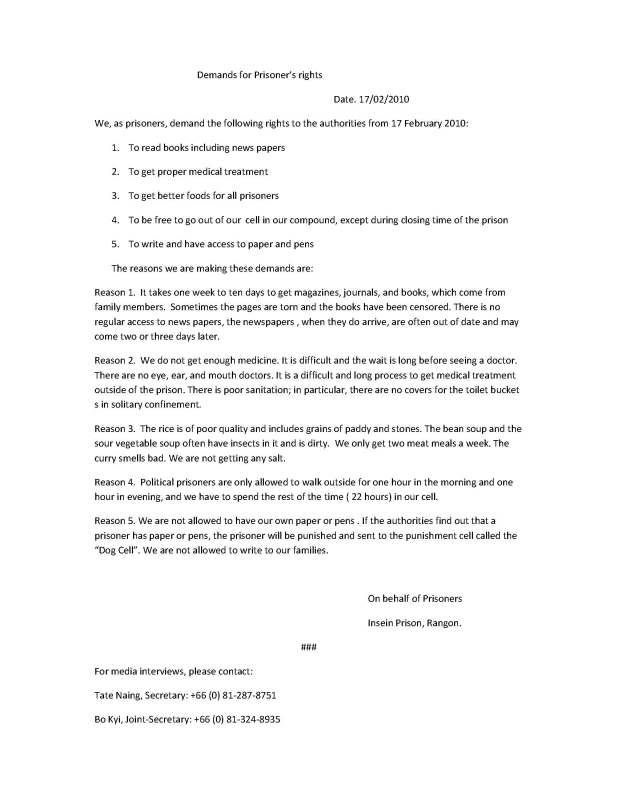






 “ဒီေတာင္းဆုိခ်က္က အင္းစိန္ ေထာင္ထဲက အက်ဥ္းသား အားလုံးရဲ႕ .....”
“ဒီေတာင္းဆုိခ်က္က အင္းစိန္ ေထာင္ထဲက အက်ဥ္းသား အားလုံးရဲ႕ .....” 













